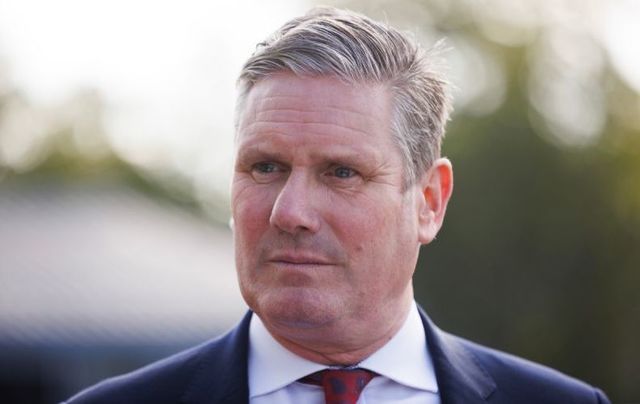UK Labour leader Sir Keir Starmer has played down the possibility of a referendum on Irish unification if he is elected as the next UK Prime Minister.
An Irish border poll is "absolutely hypothetical" and "not even on the horizon," Starmer said ahead of this weekend's Labour Party conference.
Starmer previously said that he would campaign for Northern Ireland to remain part of the UK if a referendum is held during his lifetime, stating that he would "make the case for the United Kingdom."
He has now ruled out calling a border poll if he becomes Prime Minister as polls predict.
"I don’t think we’re anywhere near that kind of question … It’s not even on the horizon," Starmer told BBC Northern Ireland.
Starmer's comments drew criticism from academics and pro-unity groups in Northern Ireland.
As per the Good Friday Agreement, the Secretary of State has the power to call a border poll "if at any time it appears likely to him that a majority of those voting would express a wish that Northern Ireland should cease to be part of the United Kingdom and form part of a united Ireland."
Ireland's Future, a civic organization advocating for a united Ireland, said Starmer's "comments run contrary to everything GFA [Good Friday Agreement] stands for."
"When the time for a border poll comes, English attempts to block democracy in Ireland will fail," the group further told the Irish Times.
?People here won’t be surprised at the arrogance of Westminster in attempting to deny democracy in Ireland.
?@Keir_Starmer comments run contrary to everything GFA stands for.
?When the time for a border poll comes, English attempts to block democracy in Ireland will fail. https://t.co/F7e5GkXyKu
— Ireland's Future - Todhchaí na hÉireann (@IrelandsFuture) October 5, 2023
Colin Harvey, a professor of human rights law at Queen's University Belfast, noted on X, formerly Twitter, that as per the principle of consent, no Westminster government can definitively rule out a border poll.
The whole point of our constitutional arrangements here is that no Westminster government can definitively rule out a border poll.
Principle of consent, and all of that.
— Colin Harvey (@cjhumanrights) October 5, 2023
Starmer also outlined a desire for power-sharing to be restored in Northern Ireland, stating that the UK Government should act as an "honest broker."
The Stormont Assembly has been collapsed for the last 18 months due to a DUP protest over internal trade barriers implemented as part of the Northern Ireland Protocol.
The DUP claims that the Protocol threatens Northern Ireland's position within the UK and has stated that it will not accept devolution until the UK Government provides legally binding assurances over Northern Ireland's place within the UK internal market.
Starmer added that he would renegotiate a post-Brexit trade deal with the EU if he becomes Prime Minister and said he was not interested in any deal that put the UK in a position of being a "rule taker."
"Our rules must be made in Westminster, according to the national interest of the UK as a whole," Starmer told the BBC.
"I am interested in resolving some of the outstanding issues. And obviously, that will mean making progress on things like the Windsor [Framework] agreement - the protocol - because that was a step in the right direction, which is why we said we would support it.
"So it's quite clear that there can be improvements and I think in Northern Ireland in particular, there will be a lot of interest in whether we cannot have some measures which take away some of these still remaining tensions that are very obviously there."
Starmer additionally stated his intention to repeal the controversial Troubles Legacy Bill, which will offer amnesty to paramilitaries and members of the British security forces for Troubles-era killings if they cooperate with new inquiries.
The bill has been passed by the Conservative-dominated House of Commons and has been widely condemned by human rights groups, Irish politicians, and members of both the nationalist and unionist communities in Northern Ireland.




Comments